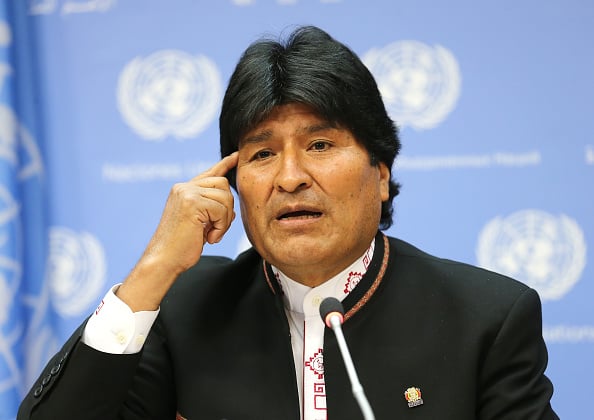What is Evo Morales’s Net Worth?
Evo Morales is a Bolivian politician and trade union organizer who has a net worth of $500 thousand. Evo Morales served as the president of Bolivia from 2006 to 2019. The country’s first indigenous president, he implemented leftwing policies with a focus on indigenous rights, environmentalism, education, and anti-imperialism. However, Morales was also criticized by many for being an authoritarian, and for creating a narco-state due to his ties with coca farming.
Early Life and Education
Juan Evo Morales Ayma was born on October 26, 1959 in the small rural village of Isallavi, Oruro, Bolivia into an indigenous Aymara family of subsistence farmers. He was one of seven children of María and Dionisio, although only he and his siblings Esther and Hugo survived past childhood. After completing his primary education, Morales attended the Agrarian Humanistic Technical Institute of Orinoca. From 1977 to 1978, he served his mandatory military service in the Bolivian Army. Although he studied for a degree in higher education, Morales did not graduate.
Cocalero Activism
After his time in the Bolivian Army, Morales moved to the Chapare province. There, he grew coca and became a prominent cocalero trade unionist in the Unified Syndical Confederation of Peasant Works of Bolivia. In his role, Morales campaigned against the joint efforts by Bolivia and the United States to eradicate coca during the War on Drugs. Believing these efforts to be an imperialist attack against indigenous Andean culture, he engaged in several anti-government protests that resulted in him being arrested multiple times.
Rise in Politics
In 1995, Morales entered the world of electoral politics. Two years later, he was elected to the Bolivian National Congress, and in 1998 he became leader of the Movement for Socialism political party. Morales used populist rhetoric and focused on issues impacting indigenous and impoverished communities. He advocated for land reform and a more equitable redistribution of money from Bolivian gas extraction. Morales gained particular attention during the Cochabamba Water War protests and Bolivian gas conflict in the early ’00s. During this time, he fought against the privatization of the water and natural gas supply in Bolivia. Although he was expelled from Congress in 2002 for supporting the anti-government protests, he came in second place in that year’s presidential election.
Getty
President of Bolivia
In 2005, Morales was elected president of Bolivia with the country’s first absolute majority in 40 years (53.7%), and the highest national vote percentage of any presidential candidate in Latin American history. He also became his country’s first indigenous president. In his role, Morales focused on nationalism, anti-imperialism, and improved conditions for Bolivia’s marginalized indigenous population. He led efforts to fight poverty, illiteracy, and gender and racial discrimination, and helped move his country toward a mixed economy that created significant economic growth. Morales and his government also worked to reduce the influence of the United States in Bolivia by building connections with leftist governments in Latin America. In early 2009, he instituted a new constitution that established Bolivia as a plurinational state.
Morales was reelected in 2009 and again in 2014. However, his second and third terms were majorly affected by infighting and dissent from within his base of support, and he was severely criticized when he sought legal options for pursuing a fourth term. During the general election in 2019, disputes occurred when there were claims of election fraud, causing mass protests across the country and calls for Morales’s resignation. Morales heeded the calls, and shortly after resigning took political asylum in Mexico and Argentina. Extolled by his supporters as a powerful champion of indigenous rights and anti-imperialism, Morales was also criticized for being an authoritarian who effected democratic backsliding in Bolivia. Many also denounced him for allegedly creating a narco-state due to his continued links with coca farming. In any context, Morales has been called the “most famous Bolivian ever.”
Statutory Rape Accusations
Morales has twice been accused of statutory rape, both in 2020 following his presidency. An investigation into the first case found that he was having relations with 19-year-old Noemí Meneses, who was placed under house arrest and was reportedly coerced into testifying without a lawyer. The second accusation of statutory rape claimed that Morales had a child with a 15-year-old; Morales argued that the complaint was one of many efforts by the Bolivian interim government to smear him.
Personal Life
Unmarried, Morales has two children from two different women: they are daughter Evaliz and son Álvaro.
All net worths are calculated using data drawn from public sources. When provided, we also incorporate private tips and feedback received from the celebrities or their representatives. While we work diligently to ensure that our numbers are as accurate as possible, unless otherwise indicated they are only estimates. We welcome all corrections and feedback using the button below.

